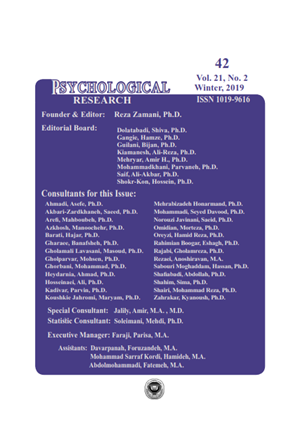"Impact of Peer Tutoring on Mathematic Learning in Multi-Grade Classes Using Single-Subject Design and Qualitative Study "
Subject Areas :Dr. yasamin Abedini 1 , S.Heshmatollah Mortazavizadeh 2
1 -
2 -
Keywords: peer tutoring multi-grade classes single-subject design mathematic learning ,
Abstract :
Educational theories and research imply the academic and social advantages of peer tutoring-based instructional situations. The purpose of the present study was to investigate and compare the impact of three types of peer tutoring on students’ mathematic achievement and motivation in multi-grade classes. The research sample consisted of two multi-grade classes selected from villages in Yasouj City during academic year 2015-2016. Sample members were selected via purposeful sampling method and were randomly assigned to control and test groups. The research instru-ments included teacher-made tests and semi-structured interviews with parents and tea-chers. The control group subjects were instruc-ted by traditional method of teaching. Fin- dings showed that not only peer-tutoring method had a considerable effect on students’ mathematical achievement, but also led to improved motivation for mathematics learning, social relationships, cooperation and team work inclinations among them.
"آصفي¬املشي، رحيم (1383). تأثیر استفاده از طرح آموزش از طريق همياري بر پيشرفت تحصيلي دانش¬آموزان دورة متوسطه نظري دورة متوسطه نظري كشور. تهران: معاونت آموزش و پرورش نظري و مهارتي، وزارت آموزش و پرورش.
خسروي، محبوبه (1382). مقايسه ميزان يادگيري به روش سخنراني، همياري و آموزش به كمك كامپيوتر درس جغرافياي اول راهنمايي پسران منطقه 2 شهر تهران در سال تحصیلی 1382- 1381. پايان نامة كارشناسي ارشد تكنولوژي آموزشي، دانشگاه علامه طباطبايي، تهران.
رستمي¬نژاد، محمدعلي (1384). مقايسه يادگيري مباني به روش يادگيري انفرادي با يادگيري در گروه¬هاي كوچك در دانش¬آموزان سال دوم رشته حسابداري هنرستان كاردانش آيت¬اله خامنهای شهرستان ورامين 84 ـ 1383، پايان¬نامه كارشناسي ارشد تكنولوژي آموزشي، دانشگاه علامه طباطبايي، تهران.
سیف، علی اکبر (1391). روان-شناسی پرورشی نوین. تهران: دوران. چاپ اول، ویرایش هفتم.
قرباني، لطيف (1380). مقايسه تأثیر يادگيري مشاركتي با يادگيري سنتي بر پيشرفت تحصيلي درس زبان انگليسي پايه سوم راهنمایي. پايان¬نامه كارشناسي ارشد برنامه¬ريزي درسي، دانشگاه علامه طباطبايي، تهران.
کدیور، پروین (1392). روان¬شناسی یادگیری. تهران: سمت.
مرتضويزاده، سيدحشمت¬الله (1393). راهنمای تدریس در کلاسهای چندپایه. تهران: عابد.
مرتضويزاده، سيدحشمت¬الله (1394). مدیریت و برنامه¬ریزی کلاسهای چندپایه. تهران: کورش.
مشهدي، حميدرضا (1382). مقايسه تأثیر روش آموزش همياری (مشاركتي) با روش آموزش سنتي بر پيشرفت¬تحصيلي دانشجويان دانشگاه تربيت معلم و رابطه آن با سبکهای شناختی. پايان¬نامه كارشناسي ارشد تكنولوژي آموزشي، دانشگاه تربيت معلم، تهران.
Benveniste, L. A., & McEwan, P. J. ( 2000). Constraints to implementing educational innovations: The case of multi-grade schools. International Review of Education, 46(1-2), 31-48.
Braudit, A. (2000). El tutor: Procesos de tutela entre alumnos. Barcelona: Paidós Ibérica.
Brown, Byron. (2010). Multigrade teaching. Johannesburg, South Africa: The Centre for Education Policy Development. (CEPD) (Pty) Ltd.
Carnine, D., Marchand-Martella, N. D. Hofmeister, A. & Farkas, G. (2002). Elements of effective reading tutoring program. American Educational Research Journal, 19, 237-238.
Duran, D. & Huerta, V. (2008). Una experiencia de tutoría entre iguales en la niversidad mexicana de Oaxaca. Revista Iberoamericana de Educación, 48, 26-40.
Goldschmid, M. L. (1976). Teaching and learning in higher education: Recent trends. Higher Education, 5, 437–456.
Jones, V. (2007). ‘I felt like I did something good’-The impact on mainstream pupils of a peer tutoring programme for children with autism. British Journal of Special Education, 34(1), 56-63.
Lingam, G. (2007). Pedagogical practices: The case of multi-class teaching in Fiji. Primary school. Educational Research and Review, 2(7), 186-192.
Little, A.W. (2006). Multigrade and multi-age teaching in classrooms in London, England. In A.W Little. (Ed), Education for all: The challenge of multigrade teaching. Amsterdam: Springer.
Mickelson, W. T., Yetter, G., Lemberger, M., Hovater, S., & Ayers, R. (2003). Reciprocal peer tutoring: An embedded assessment technique to improve student learning and achievement. In USA: Proceedings of the annual meeting of the American Education Research Association.
Miller, B. (1999d). The multigrade classroom: A resource for small, rural schools. Book 7: Planning and using peer tutoring. Northwest: Regional Educational Laboratory.
Schunk, D. H. (2008). Learning theories: An educational perspective (5th ed.).New York: Pearson Education.
Topping, K. J. (2000). The effectiveness of peer tutoring in higher and further education: A typology and review of the literature. Higher Education, 32(3), 321- 345.
Topping, K. J. (2005). Trends in peer learning. Education Psychology, 25(6),631-645.
Tzuriel, D., & Shamir, A. (2002). The effects of mediation in computer assisted dynamic assessment. Journal of Computer Assisted Learning, 18(1), 21-32.
"


